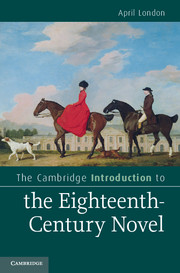Book contents
Chapter 4 - The reformation of family
Published online by Cambridge University Press: 05 June 2012
Summary
Distinctions between “given” and “chosen” families and between nuclear and extended ones are crucial to both the unfolding and resolution of plots in period fiction. In most novels, given families – the ones individuals are born into – tend to impede the protagonist’s progress and are usually either renounced or superseded by chosen ones, most often through the device of a concluding marriage that represents the newly wed partners as figures for compromise, the resolution of past injustices, and the promise of future happiness. Orphaned heroes and concealed kinship offer interesting variations on this pattern. Temporary freedom from the customary limits of the inheritance trope – including the fixities of class position, birth order, and paternal control – seems to enhance the likelihood of independence and of rewards based on merit rather than birthright. In fictions of concealed kinship – including Henry Fielding’s Tom Jones, Tobias Smollett’s Humphry Clinker, Frances Burney’s Evelina, and Eliza Fenwick’s Secresy – the disclosure or acknowledgment of paternity in the final chapters curbs the self-direction indulged in the narrative proper, allowing the status quo to be reasserted. But even in the relatively unusual instances of protagonists growing up in complete nuclear families, as in Austen’s Pride and Prejudice, parents are most often liabilities who serve as negative foils to the advancement of the younger generation.
This chapter opens with a discussion of Samuel Richardson’s History of Sir Charles Grandison, one of the few novels of the period to represent family – understood both affectively as the nexus of domesticity and genealogically as the sign of inherited status – in unequivocally celebratory terms. As we will see later in this and also in subsequent chapters, the obligations of family relationship are more often honored in the breach than the observance, affirmed in the closing pages of novels rather than appearing throughout as an achieved ideal.
- Type
- Chapter
- Information
- The Cambridge Introduction to the Eighteenth-Century Novel , pp. 89 - 111Publisher: Cambridge University PressPrint publication year: 2012



